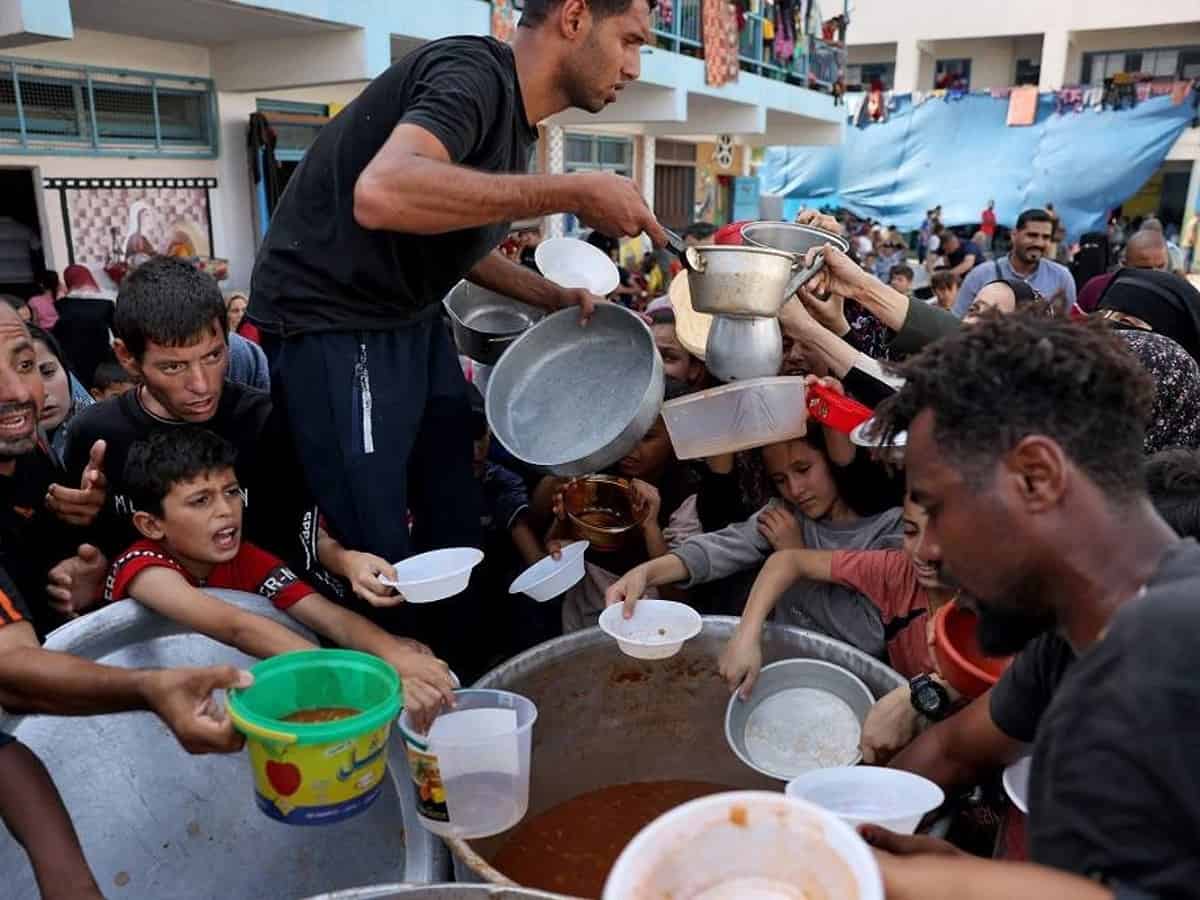
United Nations: A UN report has warned that the poverty rate in Palestine will soar by 34 per cent, thrusting nearly half a million additional people into poverty, if the war in Gaza continues for another month.
In such a scenario, Palestine’s gross domestic product (GDP) will plummet by 8.4 per cent — a loss of $1.7 billion, according to initial estimates by the UN Development Programme (UNDP) and the Economic and Social Commission for Western Asia (ESCWA).
It is estimated that, as the war hit the one-month mark, poverty had risen by 20 per cent and economic growth had declined by 4.2 per cent, said the two agencies in their report on the socio-economic impacts of the Gaza war on Palestine, which was released on Thursday.
The assessment also underscores that the International Labour Organization estimates that 390,000 jobs have already been lost in the first month of war, Xinhua news agency quoted the report as saying.
According to projections, a third month of war would see poverty increase by almost 45 per cent, raising the number of additional people pushed into poverty to more than 660,000, while the GDP will fall by 12.2 per cent with total losses of $2.5 billion.
Currently, 1.8 million Palestinians are living in poverty, said Rola Dashti, executive secretary of ESCWA.
The poverty rate in Gaza was 61 per cent before the Hamas-Israel war erupted on October 7.
The poverty rate in the West Bank was 30 per cent, said Abdallah Al Dardari, UN assistant secretary-general and director of UNDP’s regional bureau for Arab states.
The assessment warns of a sharp decline in the Human Development Index, the UNDP’s summary measure of well-being, setting development in Palestine back by between 11 to 16 years, and in Gaza by 16 to 19 years, depending on the intensity of the conflict, according to the report.
“The unprecedented loss of life, human suffering, and destruction in the Gaza Strip is unacceptable,” said UNDP Administrator Achim Steiner in a press release.
“This assessment alerts us that the impacts of this war will also have long-lasting effects and will not be confined to Gaza. On top of the humanitarian catastrophe we see unfolding, there is also a development crisis. The war is rapidly accelerating poverty in a population already vulnerable before this crisis hit.”
Dashti, who launched the report together with Al Dardari, warned that economic recovery in Gaza following a ceasefire will not be immediate, considering the large-scale displacement of the population, the massive levels of destruction and uncertain access to resources, including materials and equipment owing to the siege on Gaza.
She also warned that the consequences of the war are even more severe given the fact that the projected poverty increase is about income only.
“It’s not only the money-metric poverty. It is the multidimensional poverty that is more important,” she said, noting that almost all Gazans (96 percent) are currently multidimensionally poor.
Multidimensional poverty means the deprivation of essential services for livelihood, including health, utilities, transport and freedom of movement, she said.
Even if there is a cease-fire today, the multidimensional poverty situation will not improve quickly, she said.
With almost 1.5 million people in Gaza internally displaced since the beginning of the war and the massive destruction of houses reportedly destroyed or damaged, the assessment predicts that the economic downturn will further exacerbate the catastrophic humanitarian situation and will make recovery prospects challenging and slow, according to the report.
Israeli raid in West Bank refugee camp leaves 14 dead
At least 14 people were killed following an Israeli military raid at the Jenin refugee camp in the West Bank, the Gaza-based Palestinian Health Ministry said.
According to the Ministry, Thursday’s operation which involved armed clashes with Palestinians and airstrikes, was the deadliest such incident that lasted for over 12 hours.
The incident also resulted in extensive infrastructure damage.
It was not immediately clear if the casualties were civilians or militants.
In response to the raids, the Israel Defense Forces (IDF) said that it conducted the operation to “thwart terrorist infrastructure” and to demolish the home of a man who allegedly killed an off-duty Israeli soldier in an August 31 ramming attack, CNN reported.
“Engineering forces uncovered explosive devices intended to harm our forces in the Jenin refugee camp. The commander of the Central Command signed a demolition order for the home of the terrorist who carried out the stampede attack at the Maccabim checkpoint and the Hashmonaim checkpoint,” the military said in a statement.
According to the UN Relief Works Agency, the Jenin refugee camp, which borders the Jenin municipality and is the northernmost camp in the West Bank, houses about 23,628 Palestine refugees registered.
The Palestinian Health Ministry also said that another five fatalities were recorded on Thursday during confrontations in the course of search-and-arrest operations in Anin (Jenin), Bethlehem city, Balata Refugee Camp (Nablus), Al Am’ari Refugee Camp (Ramallah) and At Tabaqa (Hebron).
Since Hamas launched its war against Israel on October 7, 167 Palestinians, including 45 children, have been killed by Israeli forces in the West Bank.
While an additional eight people, including a child, were killed by Israeli settlers, three Israelis died in attacks by Palestinians.



